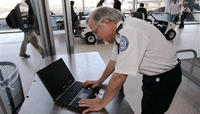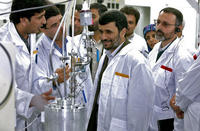-
American Muslims frustrated by the suspicions with which they are regarded
American Muslims say that nine years of denouncing terrorism, of praying side-by-side with Jews and Christians, of insisting “I’m American, too,” and many other gestures have not eased the attitude of suspicion with which Muslims in the United States are regarded; Muslim leaders say that fatigue is setting in add that they wonder how many more times will they have to condemn violent extremism before non-Muslim Americans believe them?
-
-
U.S.: Mexico's drug war posing growing threat to U.S. national security
The Obama administration sees the drug-related violence sweeping Mexico as a growing threat to U.S. national security and has launched a broad review of steps the military and intelligence community could take to help combat what U.S. officials describe as a “narcoinsurgency”; one problem with increased intelligence collaboration: U.S. agencies have been wary of sharing some intelligence because of concerns that some of their Mexican counterparts may be on the payroll of the cartels
-
-
New upgrades will make full-body scanners less privacy-offensive
New software upgrade to full-body scanners would replace the images of a passenger’s naked body with an avatar and alert authorities to a potential hidden threat, eliminating the need to keep an employee in a remote room
-
-
Obama proposes ambitious $50 billion infrastructure program
President Barack Obama unveiled an ambitious 6-year infrastructure investment program; its goals include building or repairing 150,000 miles of roads, 4,000 miles of rail lines, and 150 miles of airplane runways; the plan also includes a new air-traffic-control system designed to reduce flight delays, and an “infrastructure bank” that will help determine the worthiest projects
-
-
Transportation industry eager for more details of infrastructure plan
The White House released an information sheet that tells in broad strokes how the administration plans to use the money but did not say how much it will spend on different transportation segments or how soon it will ask Congress for the money; industry groups want to know
-
-
Local anger mounts over counter-terrorism-funded CCTVs
There are 4,200,000 CCTVs installed in the United Kingdom, leading many to describe the kingdom as a “surveillance society”; 218 of these CCTVs caused a firestorm: they were installed in a predominantly Muslim section of Birmingham — along with 169 automatic license plate recognition (ANPR) cameras; the reason for local anger: the funding for the deployment came from the U.K.’s counter-terrorism, rather than crime-fighting, authorities; residents argue this makes them all look like potential terrorists
-
-
New legal challenge to DHS laptop searches at U.S. border

The Obama administration has continued a Bush administration policy which permits officers at U.S. borders to detain travelers’ laptop computers and examine their contents even without suspecting the traveler of wrongdoing — or, in the language of DHS policy, “absent individualized suspicion”; in a federal lawsuit filed Tuesday in the Eastern District of New York, the plaintiffs allege that DHS policy of substituting “search at will” for “reasonable suspicion” violates constitutional rights to privacy and free speech
-
-
UN: Iran accelerates nuclear weapons work, hampers monitoring

Iran has now built up a stockpile of 2,803 kilograms of low-enriched uranium, despite being ordered by the UN to cease all such activity until the IAEA can determine the true nature of Tehran’s nuclear drive; at the end of August, a total 8,856 uranium-enriching centrifuges had been installed at Natanz, up from 8,528 in May; the number of machines being fed with UF6 — uranium hexfluoride — had declined to 3,772 from 3,936, though, owing to on-going technical difficulties (some of which caused by Israeli and U.S. covert sabotage campaign); Iran has now produced at least 22 kilograms of higher-enriched uranium, bringing the Islamic republic closer to levels needed to make the fissile material for a nuclear bomb
-
-
IDF shows Hezbollah removing arms from exploded home
One lesson both Hezbollah and Hamas have drawn from their recent military encounters with Israel — Hezbollah in July-August 2006, Hamas in December 2008-January 2009 — is that both would benefit from increasing even more the use of the Shi’a population in southern Lebanon (Hezbollah) and the Palestinian population in the Gaza Strip (Hamas) as human shields against the Israeli military; hiding weapons and explosives in residential buildings, however, increases the number of deadly accident, as the one which occurred in Lebanese village of Shehabiyeh last Friday
-
-
Small thorium reactors could lead to fossil-fuel-free world within five years
An argument is made that nuclear reactors which use thorium as an accelerator (hence the technical name: Accelerator Driven Thorium Reactors, or ADTR) could lead to fossil-fuel-free world within five years; thorium is an abundant mineral deposit, with 3 to 5 times more thorium in the world than uranium; more importantly, virtually all of the thorium mined can be used as fuel compared to only 0.7 percent of the uranium recovered in its natural state, this means, in energy terms, that one ton of thorium mined is equivalent to 200 tons of uranium mined, which is equivalent to 3.5 million tons of mined coal; ADTRs also enjoy proliferation resistance advantages compared to other reactor systems
-
-
Chinese government funds research based on stolen U.S. trade secrets
Chinese national, Kexue Huang, charged with economic espionage involving theft of trade secrets from Dow AgroSciences, a leading U.S. agricultural company; Huang published an article without Dow’s authorization through Hunan Normal University (HNU) in China, which contained Dow trade secrets; the article was based on work supported by grants from the National Natural Science Foundation of China (NSFC), an agency of the Chinese government
-
-
Pakistani military delegation cancels U.S. talks over stringent security checks
A high-level Pakistani military delegation has cancelled a visit to the United States after members of an earlier delegation, which came to the United States to visit the U.S. military’s Central Command (CENTCOM), were subjected to stringent — the Pakistanis say “unwarranted” — security checks at Dulles International Airport
-
-
State of Arizona files Opening Brief in Ninth Circuit Court of Appeals
State of Arizona filed an appeal of Judge Susan Bolton’s decision which accepted many of the Obama administration’s objections to the Arizona Immigration law; the appeal argues that the Arizona law does not amount to a usurpation by the state of federal power
-
-
Taliban launches poisonous gas attack on school girls and teachers in Afghanistan
The Taliban continues its violent campaign to push Muslim women back into Medieval times; in Afghanistan, the Taliban is pursuing a campaign against girls’ education; the organization’s latest tactics: poisonous gas attacks on girls’ schools, aiming to scare students and teachers; Taliban operatives launched eight poisonous gas attacks on girls schools since April, and earlier today it launched the ninth attack, this time against a girls high school
-
-
Report says Gaza exporting terror
A former Gazan who was in the Islamic Jihad set up a terror network in Morocco aimed at targeting key Moroccan officials and Jews, an intelligence report said
-
More headlines
The long view
Factories First: Winning the Drone War Before It Starts
Wars are won by factories before they are won on the battlefield,Martin C. Feldmann writes, noting that the United States lacks the manufacturing depth for the coming drone age. Rectifying this situation “will take far more than procurement tweaks,” Feldmann writes. “It demands a national-level, wartime-scale industrial mobilization.”
No Nation Is an Island: The Dangers of Modern U.S. Isolationism
The resurgence of isolationist sentiment in American politics is understandable but misguided. While the desire to refocus on domestic renewal is justified, retreating from the world will not bring the security, prosperity, or sovereignty that its proponents promise. On the contrary, it invites instability, diminishes U.S. influence, and erodes the democratic order the U.S. helped forge.
Fragmented by Design: USAID’s Dismantling and the Future of American Foreign Aid
The Trump administration launched an aggressive restructuring of U.S. foreign aid, effectively dismantling the United States Agency for International Development (USAID). The humanitarian and geopolitical fallout of the demise of USAID includes shuttered clinics, destroyed food aid, and China’s growing influence in the global south. This new era of American soft power will determine how, and whether, the U.S. continues to lead in global development.
Water Wars: A Historic Agreement Between Mexico and US Is Ramping Up Border Tension
As climate change drives rising temperatures and changes in rainfall, Mexico and the US are in the middle of a conflict over water, putting an additional strain on their relationship. Partly due to constant droughts, Mexico has struggled to maintain its water deliveries for much of the last 25 years, deliveries to which it is obligated by a 1944 water-sharing agreement between the two countries.
How Disastrous Was the Trump-Putin Meeting?
In Alaska, Trump got played by Putin. Therefore, Steven Pifer writes, the European leaders and Zelensky have to “diplomatically offer suggestions to walk Trump back from a position that he does not appear to understand would be bad for Ukraine, bad for Europe, and bad for American interests. And they have to do so without setting off an explosion that could disrupt U.S.-Ukrainian and U.S.-European relations—all to the delight of Putin and the Kremlin.”
How Male Grievance Fuels Radicalization and Extremist Violence
Social extremism is evolving in reach and form. While traditional racial supremacy ideologies remain, contemporary movements are now often fueled by something more personal and emotionally resonant: male grievance.
